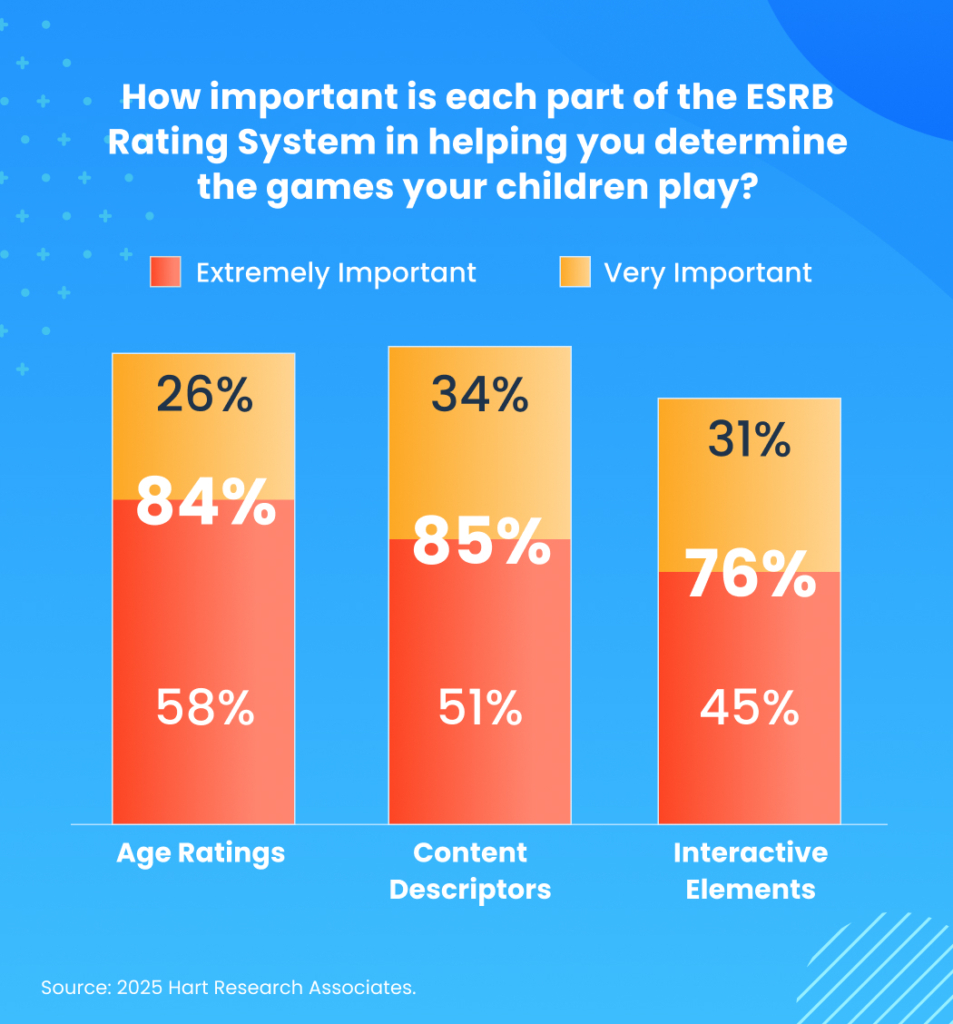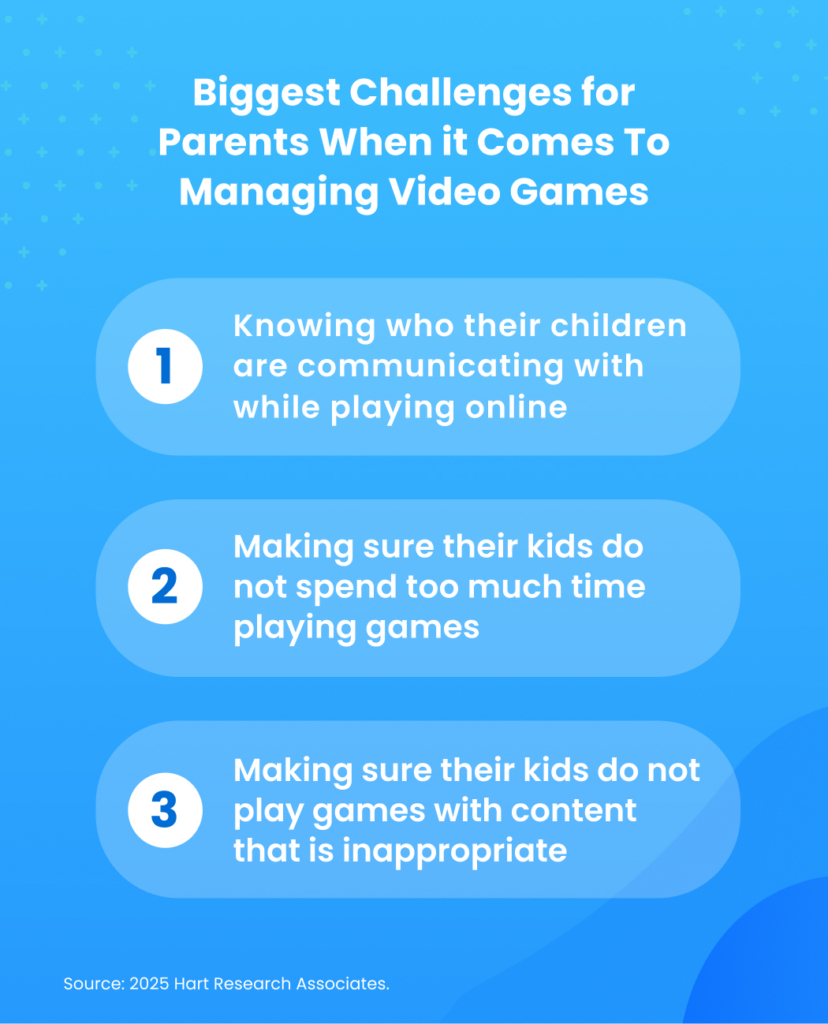Sometimes no news is good news. ESRB’s annual survey of parents exemplifies this by illustrating that parents continue to leverage many of the resources at their disposal to make sure their kids have appropriate video game experiences both online and offline.
Below are a number of trends from ESRB’s 2025 Awareness and Use survey of parents with kids (aged 3 – 15) who play video games.
Trend: Awareness and Use of ESRB Ratings Remains Strong
The 2025 Awareness and Use survey is primarily leveraged to measure… Awareness and use of the ESRB rating system among parents.
According to this year’s results, 83% of parents whose kids play video games say that they are aware of the ratings. This is one point lower than the 2024 results. 77% (also one point lower than last year) of parents say they check the age rating “every time” or “most of the time” when buying or downloading a new game for their children.
Parents also say that all three parts of the ESRB rating system are important.

Trend: Parents Are Confident That ESRB Ratings Are Accurate
It is important that parents believe that ESRB’s age and content ratings will reflect their own views about age-appropriateness. In the survey, a large majority (73%) of parents said they are confident that ESRB ratings will accurately describe the content of the game.
Meanwhile, nearly 70% of parents said that they are similarly confident that the ratings will accurately reflect their own views about age appropriateness.
Trend: Parents Are Involved In Their Kids Video Game Experiences
For several years ESRB has been gauging how involved parents are in their kids’ video games, and it’s wonderful to see how this has progressed.
To start, 70% of parents say they regularly (“every day” or “every week”) play video games with their children. This extends to how parents are picking appropriate games with 54% of parents saying the top method for deciding age appropriateness is to play the game themselves (with checking ESRB-assigned ratings coming in at a close second!).
Trend: Parent Challenges Are Evergreen When It Comes To Video Games
ESRB assesses the biggest parental challenges when it comes to managing their kids’ video game play to help ensure that the organization is meeting parents where they are and providing resources that parents find truly helpful. This shows that parental challenges around managing video games for their kids largely stay the same.

Fortunately, there are resources available to parents to manage all of these. Checking the ESRB-assigned rating information goes a long way to help parents better understand what to expect from a game before they decide to purchase or download it for their kids. Rating summaries with more detail about the content and its context in many of the most popular games are available at esrb.org and the ESRB mobile app. In terms of online communication, ESRB assigns a specific Interactive Element – Users Interact – to signal to parents that a game offers the ability to communicate with other players in some way (i.e., text, voice, user generated content, etc.).
Parental controls can also help manage all of these challenges. 79% of parents say they are already using parental controls on a gaming device (console, PC, mobile). These settings are available on virtually every device that can play video games, and can help manage:
- Which games kids are permitted to play (based on the ESRB-assigned rating);
- When and for how long they are permitted to play games;
- Whether they can spend real money on in-game purchases or new games, and;
- With whom they can communicate online when playing games.
ESRB offers step-by-step parental controls guides at ParentalTools.org. For more tips about how you can manage your kids’ video game experiences visit ESRB’s Family Gaming Guide.
 Patricia E. Vance is the president of the Entertainment Software Rating Board (ESRB). In her position, she leads the teams responsible for assigning age and content ratings to video games and apps, enforcing marketing guidelines adopted by the video game industry, and operating ESRB Privacy Certified, an FTC-sanctioned COPPA Safe Harbor Privacy seal certification program.
Patricia E. Vance is the president of the Entertainment Software Rating Board (ESRB). In her position, she leads the teams responsible for assigning age and content ratings to video games and apps, enforcing marketing guidelines adopted by the video game industry, and operating ESRB Privacy Certified, an FTC-sanctioned COPPA Safe Harbor Privacy seal certification program.
The post Research: No News is Good News When It Comes to Appropriate Video Games appeared first on ESRB Ratings.



This is an interesting perspective on video games and parental perceptions. It’s great to see research shedding light on how silence can be a positive sign in this context. Looking forward to more insights on this topic!
I’m glad you found it interesting! It’s fascinating how the ESRB survey shows that many parents feel comfortable with the games their children play, suggesting that awareness and communication play a key role in gaming choices. It really highlights the importance of staying informed about both the content and the potential benefits of video games.
Absolutely, it’s intriguing how parents’ perceptions can shape their children’s gaming experiences. The survey highlights a growing awareness of the importance of age-appropriate content, which can lead to healthier gaming habits.
I completely agree! It’s fascinating to see how parents’ attitudes towards gaming not only influence their choices but also impact how kids engage with video games overall. This survey really highlights the importance of communication between parents and children about gaming content.
Absolutely! It’s interesting to note that parents’ perceptions can shape the types of games that are developed and marketed. As they become more informed about the benefits of gaming, we might see a shift in the industry towards more educational and positive content.